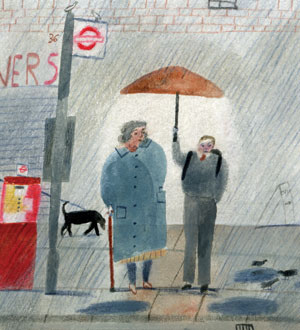The Shrink & The Sage: Are we compassionate enough?
Roula Khalaf, Editor of the FT, selects her favourite stories in this weekly newsletter.
The Shrink

Compassion is probably not high on the list of people’s desires when it comes to self-improvement. Most of us are more likely to go for assertiveness, confidence or charisma. But, according to psychologist Paul Gilbert, compassion – at its simplest a wish to be kind to oneself and to others – is an invaluable attitude to develop. Left to our own devices, he explains, we are ruled mainly by two evolution-shaped drives: detecting and escaping danger and getting the things we want, such as food or sexual partners.
That’s fine as far as it goes, but these default settings tend to loom too large, leaving what he calls our “soothing system” under-developed. We don’t just need to escape danger and acquire things, we also need times of peacefulness and contentment. For this, compassion and connection with others are crucial. Even just imagining someone being kind to us can have a calming effect on the nervous system.
Since we’re not built to find compassion easy, we need to make an effort to nurture it, overriding some of our more pressing impulses. If you’re feeling worried or anxious about something, for instance, you could practise asking yourself: how would I see and handle this situation if I were at my most compassionate?
Most important is to develop a feeling of connection with other living things, a sense that “all of us are on this journey together as part of the same flow of life and common humanity”, as Gilbert says.
Think about it through the day, when normally there is no lack of opportunity to feel annoyed with people. Instead of inwardly cursing, remind yourself that this is another human being trying to deal with life and maybe getting it wrong, just like the rest of us. If all else fails, there’s always what Gilbert calls “compassion under the duvet”. Before you get up each morning, make a habit of focusing on your intention to be compassionate. It may not transform your life – but it’s a start.
…
The Sage
It’s an interesting reflection of the contemporary world that many of the things that were once considered virtues of character have been rebranded as “soft skills” with clear instrumental benefits for their possessors. Compassion is no exception, with many now advocating its importance in business and management.
It’s easy to be cynical about the appropriation of ethical values for corporate ends, but in this case it might be that the virtue is improved by a bit of hardheadedness.
The origins of the word are in the Latin com and pati, meaning to suffer together. In its modern sense, compassion requires not just this visceral empathy, but an appropriate response to it.
That’s why there is nothing soft about being truly compassionate. First of all, you have to really be sure you have understood how others are feeling and not merely assumed they feel how you think they feel. Second, feeling someone else’s pain is not good enough: you have to know how you can lessen it, and be willing and able to do what’s necessary. Both these steps require thought and understanding. Emotion here is useless unless it is guided by reason. Thoughtless generosity can sometimes cause as much harm as stubborn selfishness, inappropriate aid can hinder more than help.
For that reason, compassion may be more at home in the corporate world than is commonly expected. It’s true that businesses can be more concerned with looking good than doing good. But when you have to answer to stakeholders, there is at least some pressure to show not just that you take the welfare of others seriously, but that you are actually doing something constructive about it and not merely wasting resources on empty gestures.
We would be advised to bring some of this rigour into our own private practice of compassion. Doing so requires overturning much received wisdom, demonstrating that the most effectively compassionate are both sympathetic and sceptical, careful and generous with money, warm and calculating.
The Shrink & The Sage live together in southwest England. To suggest a question, email shrink&sage@shrink&sage.com
Comments